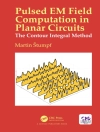This book will provide insight into the principles and applications
of nonlinear effects in fibers for students, researchers, and
developers who have a basic understanding of electromagnetic theory
under their belts. It will explore the physics, limitations,
applications, and research results surrounding nonlinear
effects in fiber optics. In addition to communications,
optical fibers are already used in medical procedures,
automobiles, and aircraft and are expected to have many other
applications. This will expand the range of industry workers
who will find a book of this type useful.
قائمة المحتويات
Preface.
1 Introduction.
References.
2 Electromagnetic Wave Propagation.
2.1 Wave Equation for Linear Media.
2.2 Electromagnetic Waves.
2.3 Energy Density and Flow.
2.4 Phase Velocity and Group Velocity.
2.5 Reflection and Transmission of Waves.
2.6 The Harmonic Oscillator Model.
2.7 The Refractive Index.
2.8 The Limit of Geometrical Optics.
Problems.
References.
3 Optical Fibers.
3.1 Geometric Optics Description.
3.2 Wave Propagation in Fibers.
3.3 Fiber Attenuation.
3.4 Modulation and Transfer of Information.
3.5 Chromatic Dispersion in Single-Mode Fibers.
3.6 Polarization-Mode Dispersion.
Problems.
References.
4 The Nonlinear Schrödinger Equation.
4.1 The Nonlinear Polarization.
4.2 The Nonlinear Refractive Index.
4.3 Importance of Nonlinear Effects in Fibers.
4.4 Derivation of the Nonlinear Schrödinger Equation.
4.5 Soliton Solutions.
4.6 Numerical Solution of the NLSE.
Problems.
References.
5. Nonlinear Phase Modulation.
5.1 Self-Phase Modulation.
5.2 Cross-Phase Modulation.
Problems.
References.
6. Four-Wave Mixing.
6.1 Wave Mixing.
6.2 Mathematical Description.
6.3 Phase Matching.
6.4 Impact and Control of FWM.
6.5 Fiber Parametric Amplifiers.
6.6 Parametric Oscillators.
6.7 Nonlinear Phase Conjugation with FWM.
6.8 Squeezing and Photo-Pair Sources.
Problems.
References.
7 Intrachannel Nonlinear Effects.
7.1 Mathematical Description.
7.2 Intrachannel XPM.
7.3 Intrachannel FWM.
7.4 Control of Intrachannels Nonlinear Effects.
Problems.
References.
8 Soliton Lightwave Systems.
8.1 Soliton Properties.
8.2 Perturbation of Solitons.
8.3 Path-Averaged Solitons.
8.4 Soliton Transmission Control.
8.5 Dissipative Solitons.
8.6 Dispension-Managed Solitons.
8.7 WDM Soliton Systems.
Problems.
References.
9 Other Applications of Optical Solitons.
9.1 Soliton Fiber Lasers.
9.2 Pulse Compression.
9.3 Fibers Bragg Gratings.
Problems.
References.
10 Polarization Effects.
10.1 Coupled Nonlinear Schrödinger Equations.
10.2 Nonlinear Phase Shift.
10.3 Solitons in Fibers with Constant Birefringence.
10.4 Solitons in Fibers with Randomly Varying Birefringence.
10.5 PMD-Induced Soliton Pulse Broadening.
10.6 Dispersion-Managed Solitons and PMD.
Problems.
References.
11 Stimulated Raman Scattering.
11.1 Raman Scattering in the Harmonic Oscillator Model.
11.2 Raman Gain.
11.3 Raman Threshold.
11.4 Impact of Raman Scattering on Communication Systems.
11.5 Raman Amplification.
11.6 Raman Fiber Lasers.
Problems.
References.
12 Stimulated Brillouin Scattering.
12.1 Light Scattering at Acoustic Waves.
12.2 The Coupled Equations for Stimulated Brillouin Scattering.
12.3 Brillouin Gain and Bandwidth.
12.4 Threshold of Stimulated Brillouin Scattering.
12.5 SBS in Active Fibers.
12.6 Impact of SBS on Communication Systems.
12.7 Fiber Brillouin Amplifiers.
12.8 SBS Slow Light.
12.9 Fiber Brillouin Lasers.
Problems.
References.
13 Highly Nonlinear and Microstructured Fibers.
13.1 The Nonlinear Parameter in Silica Fibers.
13.2 Microstructured Fibers.
13.3 Non-Silica Fibers.
13.4 Soliton Self-Frequency Shift.
13.5 Four-Wave Mixing.
13.6 Supercontinuum Generation.
Problems.
References.
14 Optical Signal Processing.
14.1 Nonlinear Sources for WDM Systems.
14.2 Optical Regeneration.
14.3 Optical Pulse Train Generation.
14.4 Wavelength Conversion.
14.5 All-Optical Switching.
Problems.
References.
Index.
عن المؤلف
Mário F. S. Ferreira, Ph D, is the leader of the Optics and Optoelectronics Group of the I3N, the Institute of Nanostructures, Nanomodelling and Nanofabrication, a national Associate Laboratory. He has written for more than 300 scientific journal and conference publications and has served as an advisor for many scientific journals and publishers. Dr. Ferreira is a well-respected leader and lecturer for the Optical Society of America and SPIE, along with the New York Academy of Sciences, the American Association for the Advancement of Science, the European Optical Society, the European Physical Society, and the Portuguese Physical Society.












